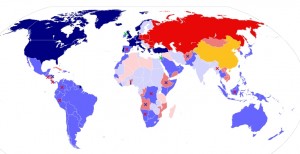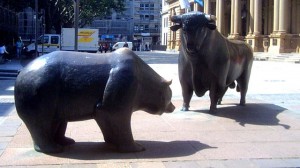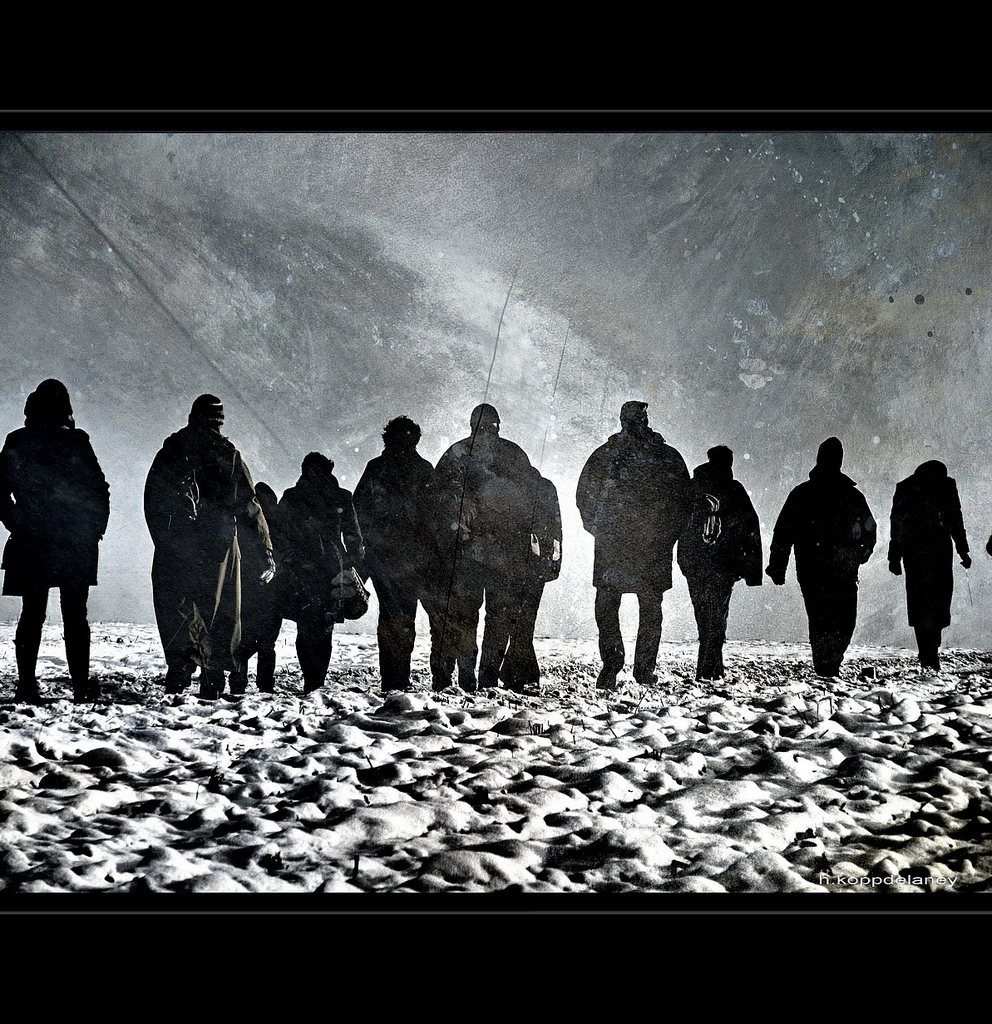What Does "Bipolar" Mean?: Five Surprising Uses From Across the Internet
In order to put together this site, I need to do a lot of online searches. Most of those searches involve searching for the term “bipolar”. Along with information that I find useful for my daily news or my weekly blog, I also find something of a flotsam of other uses of the term that can be a little surprising. Since I’ve had to spend so much of my time wading through these alternative uses of the term, I figured I was entitled to get some use out of them. So, I’ve collected together these uses that are sometimes interesting, sometimes bizarre and sometimes offensive.
#1: “Bipolar” International Politics

Source: Chabacano - CC BY-SA 3.0
I suppose the world isn’t as “bipolar” as it was back during the Cold War, when the U.S.S.R. and the U.S.A. competed for dominance, but the word still crops up from time to time. For example, as China’s influence grows, some people have asked whether international politics will become more “bipolar”, with China and the U.S.A. competing for power. For instance, this article in the Economonitor references the upcoming “‘bipolar confrontation’ between America and China.” Wikipedia has a section about it here.
#2: A Fluxy Market

Source: Thomas Richter - CC BY-SA 3.0
I suppose on one level, this isn’t exactly insulting. Since the market is already said to have “moods”, an extension of that analogy is that, when the moods of the market start acting like bipolar people do, then one might say it is bipolar. Of course, this is something of a stretched metaphor. Moreover, illness metaphors don’t exactly respect the seriousness of the condition (I always cringe a little when I hear something described as a “cancer”). So, we have the standard problem with disease metaphors which is that they don’t respect the seriousness of the condition, even if the analogy is apt per se.
The problem is that the analogy isn’t even correct. The “bipolar market” doesn’t represent bipolar disorder with long episodes in a cycle. “Bipolar” here just means “unstable”. If anything, the metaphor should simply be that the market is having a mixed episode or is rapid cycling, not that it’s bipolar. Underlying the “bipolar market” metaphor is an assumption that “bipolar” just means “unstable”. However, this is already a caricature of bipolar disorder.
This isn’t a rare metaphor, either. Literally every other day, I find a news story referring to the “bipolar market”. Here is a particularly egregious example this week from Reuters, of all sources. The title calls the market “bonkers” and then uses the word “bipolar” later in the same context, using them as though they are synonyms. How does this stuff slip past editors?
#3: A Kind of Electrical Transmission
Apparently, there is a way of transmitting electricity that is called “bipolar”. This shows up on the news feeds as new discoveries are made in the area, or new inventions using bipolar electricity transmissions are used. To be honest, I don’t really understand anything to do with electricity, except that I shouldn’t touch it, and I should call a professional whenever I need something fixed. Here is a picture of a bipolar high-voltage direct current:

Public Domain
No, it didn’t make any sense to me either, but apparently these things are fairly powerful. Basically, because the circuit is bipolar, if one part of the transmission fails, electricity will still flow at half capacity. In effect, bipolar currents provide their own backups, which cuts down on power failures. Since I dislike power failures, they get a +1 vote from me.
There’s nothing the least bit offensive about this use of the term, as it was coined back when bipolar disorder was called “melancholia”. In fact, it was an opportunity for me to learn a (very) little bit about electricity, so great!
#4 A Type of Nebula

Public Domain
Of course, there’s nothing offensive about this use. It’s just another meaning of the term “bipolar”. I can’t help feeling a little bit of extra affection for these nebulae. After all, of all the things in the world, we ended up with something of the same name. Sure, I’m a human being and it’s a nebula, but there’s a certain kind of kinship that comes with name sharing. I think I might find ways to sneak pictures of bipolar nebulae into my webpages from now on, as a kind of running in-joke.
#5: B*&ch
I recently started a Twitter account (which you can join here!), and I was introduced to the bizarre world of Twitter linguistics. Looking around for other channels dedicated to bipolar disorder, I realized something awful.
In many cases, “bipolar” is simply being used as a synonym for, well, “b*&ch”. I’d actually heard this use of the term once before in my life. At first, I figured the person had actually dated a bipolar woman, but eventually realized he just meant to say that he thought she was moody. The term is always derogatory and almost exclusively used to refer to women. In several cases on Twitter, women were using it to refer to themselves.
Here are some examples of channels I found. I deleted the actual channel names here, but the first one includes both the words “b*&ch” and “bipolar”, while the second one uses the word “b*&ch”:
“————— Lick My Braces ツ ♡ ♑
Imma FAKE ! iSteal Tweets, iBreak Hearts & iPiss On Cats ^-^ I’m A Famous A** Nobody & Everyone LOVES To HATE Me BOAN Follow My TBestFriend @——– [: ♡”
“———– R33’z mind fuq’n you
IM LIVIN ON DIS WEIRD PLANET.LOOK IN MY EYES ND WATCH AS I MIND FUQ U.MI MOUTH BIPOLAR ITS BOUND TO SAY W.E.& I.D.G.A.F ¯_(ツ)_/¯ #——–”
To translate, these are basically people who are exclaiming just what “b*&ches” they are, and equating their *cough* directness with being bipolar. For instance, that second one says “My mouth is bipolar. It’s bound to say whatever, and I don’t give a f*&k.” There are dozens and dozens of channels like this on Twitter, to the point where finding legitimate channels about bipolar disorder is difficult.
It goes without saying that this is fairly offensive, though, from what I could make out above, these Tweeters don’t really care if they offend people. It was a shame to see that, for a good portion of people on Twitter, “bipolar” just means something like “b*&ch”.
So Now Then
The internet is a weird place. One of the fun things about news searches is that you end up discovering a lot of uses of terms that you didn’t know about, and a lot of uses of terms that you didn’t want to know about. Unfortunately, alongside fun uses in international relations, electrical engineering and astronomy, “bipolar” right now can mean simply “unstable” or even “b*&ch”. These uses must be relatively new, as bipolar disorder wasn’t even called “bipolar disorder” until a couple of decades ago. They show that there are still some real misconceptions of bipolar disorder out there, and we have a lot of work to do.









I see this a lot, the b***h part I mean. It’s sad, a lot of people don’t understand and don’t care to understand. I see a lot of people who seem to think that if you have Bi Polar disorder your one step away from becoming a serial killer. I think in some cases the media plays a part in this, it seems like the only time you them talk about this it’s because someone who did some terrible thing also just happened to have Bi Polar. We need more education about the disorder out there for the public I think so that people will see that those of us who have this only want to be respected and to not be insulted or looked upon as different, just like everyone else in the world.
Yes, the use of it on Twitter especially hurt my feelings. I was looking for other tweeters who were discussing bipolar disorder, and they were a minority compared to the offensive use. It actually made real bipolar tweeters very hard to find.
Look up bipolar in the dictionary; it refers to anything with 2 poles. Earth is bipolar (North & South Poles), batteries are bipolar (positive & negative), etc. Doctors began using this pre-existing word to describe a condition with 2 extremes; mania and depression. Although the word bipolar is misused, overused, and used carelessly; every negative use is not a slam against us. The Stock Market is bipolar; high & low, buy & sell, bull & bear. Eliminating stigma is essential but we can’t react and overreact to everything or we will damage our credibility.
Hi Martha,
Thank you for the comment. I understand that “bipolar” has a meaning of anything with two poles, but the stock market cases are often explicit about comparison with bipolar disorder, not just bipolarity. Have a look at this one, for instance instance from Investopedia: The Market’s Bipolar Vistaprint Disorder. When doing my research, I find this sort of thing almost every day. Back when bipolar disorder was still called “manic depression,” people used to call the market “manic-depressive,” most famously Benjamin Graham. Warren Buffet at one point said that the market has “incurable emotional problems,” citing Graham. John Maynard Keynes called the market “a manic depressive.” Nassir Ghaemi has made the same analogy in Psychology Today. There was even an academic article named “Does Mr. Market suffer from bipolar disorder?” just two years ago.
So, in the case of the markets, it does refer to manic-depressive illness, as the analogy is an older one than the term “bipolar disorder.” That’s why it refers to the frequency of market shifts, which should be irrelevant to the bipolarity of the market if the term were being used literally.
Best,
Daniel
i have problems with anyone who casually throws out the terms bipolar and schizophrenic describing someone or something they don’t like, especially when using them to describe someone as a b*%ch. granted most people who use the terms in a derogatory manner are ignorant about mental illness, but it doesn’t make it right.
I think you’ve caught what’s wrong with a lot of these uses, Linda. It’s that our condition is being used as a term of abuse. It implies that being like us is an insult in itself.
Sorry for the patronizing tone of my first comment. Many people use words imprecisely and not every use of the word “bipolar” is pejorative. We see the word bipolar and tend to assume intent that may not be there. The bitch thing sounds like one more reason not to go on Twitter! ABC currently has 2 shows that call women bitches in the title. Characterizing women as bitches is as offensive to me as the stereotypical misconceptions about bipolar disorder, Thank you for the public service of your blog, M
No worries, Martha 🙂 I don’t think every use is pejorative, either, just when the word is used as an insult. That’s what Ghaemi gets wrong.